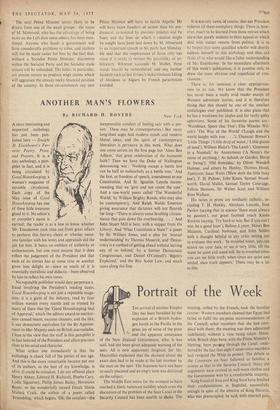ANOTHER MAN'S FLOWERS
By RICHARD H. ROVERE New York A MOST interesting and important anthology has just been pub- lished here — Dwight D. Eisenhower's Fay- 4, orite Poetry, Prose, 181 and Prayers. It is a ./ tiny anthology, a pam- phlet in fact, and it is being circulated by Good Housekeeping, a woman's magazine of enviable circulation. Each copy of the May issue of Good Housekeeping has one of these little treasures glued to it. No editor's or compiler's name is carried; the reader is at a loss to know whether Mr. Eisenhower took time out from great affairs to perform this literary. chore or whether some- one familiar with his tastes and appraisals did the job for him. It bears no emblem of authority or authorisation, but one must assume that it does reflect the judgement of the President and that each of its entries has at some time or another given him delight or—since so much of it is essentially moralistic and didactic—been observed by him to reflect his own views.
No reputable publisher would dare perpetrate a fraud involving the President's reading tastes. Good Housekeeping is not just a reputable maga- zine; it is a giant of the industry, read by four million women every month and so trusted by many of them that the 'Good Housekeeping Seal of Approval,' which the editors award to meritor- ious canned beans, vacuum cleaners, and the like, is our democratic equivalent for the By-Appoint- ment-to-Her-Majesty seals on British marmalades. I lean to the view that the stuff in this pamphlet is in fact beloved of the President and offers precious clues to his mind and character.
What strikes one immediately is that the anthology is chock full of the pieties of our age. And this is the more remarkable because not one of its authors, to the best of my knowledge, is alive. (I could be mistaken. I do not offhand place Henry Abbey, Edward H. Richards, Phcebe Cary, Lydia Sigourney, Philip James Bailey, Horatious Bonar, or the wonderfully named Dinah Maria Mulock Craik, the author of a poem called. 'Friendship,' which begins, 'Oh, the comfort—the inexpressible comfort of feeling safe with a per- son.' These may be contemporaries.) But many long-dead sages had modern minds and modern liberal ideas, and the spirit of contemporary liberalism is pervasive in this work. What does one come across on the first page but 'Abou Ben Adhem,' that great celebration of the humanist faith? Then we have the Duke of Wellington denouncing war : 'Nothing except a battle lost can be half so melancholy as a battle won.' And the first; or freedom of speech, amendment to our Constitution. And St. Ignatius Loyola recom- mending that we 'give and not count the cost.' And a one-world poem called 'The Wonderful World,' by William Brighty Rands, who may also be contemporary. And Ralph Waldo Emerson giving assurance that dictators will not flourish for long—`There is always some levelling circum- stance that puts down the overbearing. . . .' And John Stuart Mill is here, with a snippet from On Liberty. And 'What Constitutes a State?' a poem by Sir William Jones, and a plea for 'mutual understanding' by Thomas Masaryk, and 'Demo- cracy is a method of getting ahead without leaving any of us behind,' by a former Democratic Congressman, and Daniel O'Connell's 'Bigotry Explained,' and the Boy Scout Law, and much more along this line. It is scarcely news, of course, that our President believes all these exemplary things. There is, how- ever, much to be learned from those entries which are' either purely esthetic in their appeal or which deal with matter remote from politics. It is to be hoped that some qualified scholar will shortly address himself to this anthology and thus aid those of us who would like a fuller understanding of Mr. Eisenhower. In the immediate aftermath of this work's publication, it is possible only to draw the most obvious and superficial of con- clusions.
There is, for instance, a clear apprOpriate- ness to its size. We know that the President has, never been a really avid reader except of Western adventure stories, and it is therefore fitting that this should be one of the smallest anthologies ever published. It is also plain that he has a weakness for jingles and for really pithy aphorisms. Some of his favourite poems are : 'Woodman, Spare that Tree'; Ella Wheeler Wil- cox's 'The Way of the World' ('Laugh and the world laughs with you . . .'); Ebenezer Brewer's 'Little Things' (Tittle drop of water,/ Little grains of sand'); William Blake's 'The Lamb'; 'Grammar in a Nutshell,' by Anonymous ('A Noun's the name of anything,/ As School, or Garden, Hoop or Swing'); 'Old Ironsides,' by Oliver Wendell Holmes; and others by Henley, Thomas Hood, Tennyson, Isaac Watts ('How doth the little busy bee'), T. H. Palmer, John Keats, Samuel Wood- worth, David Mallet, Samuel Taylor Coleridge, Felicia Hemans, Sir Walter Scott and William Ross Wallace.
His tastes in prose are similiarly catholic, in- cluding T. H. Huxley, Abraham Lincoln, Ivan Pavlov (saying that in science there must always be passion'), our great football coach Knute Rockne (saying, 'Try hard to win. But if you can't win, be a good loser'), Bulwer-Lytton, Moses Ben Maimon, Cardinal Newman, and John Selden with a thought helpful to any critic setting out to evaluate this work : 'In troubled water, you can scarce see your face, or see it very little, till the water be quiet and stand still. So in troubled times you can see little truth; when times are quiet and settled, then truth appears.' There may be a lot to this.






























 Previous page
Previous page